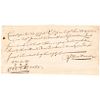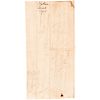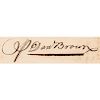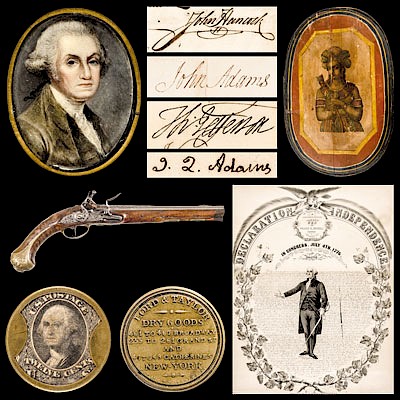1775 Receipt for Joseph Trumbull the First Continental Army Commissary General
Lot 167
Estimate:
$800 - $1,000
Absentee vs Live bid
Two ways to bid:
- Leave a max absentee bid and the platform will bid on your behalf up to your maximum bid during the live auction.
- Bid live during the auction and your bids will be submitted real-time to the auctioneer.
Bid Increments
| Price | Bid Increment |
|---|---|
| $0 | $10 |
| $200 | $20 |
| $300 | $25 |
| $500 | $50 |
| $1,000 | $100 |
| $2,000 | $200 |
| $3,000 | $250 |
| $5,000 | $500 |
| $10,000 | $1,000 |
| $20,000 | $2,000 |
| $30,000 | $2,500 |
| $50,000 | $5,000 |
| $100,000 | $10,000 |
| $200,000 | $20,000 |
| $300,000 | $25,000 |
| $500,000 | $50,000 |
About Auction
By Early American History Auctions
Jun 1, 2019
Set Reminder
2019-06-01 12:00:00
2019-06-01 12:00:00
America/New_York
Bidsquare
Bidsquare : Historic Autographs, Colonial Currency, Political Americana & Revolutionary War Era
https://www.bidsquare.com/auctions/early-american-history-auctions/historic-autographs-colonial-currency-political-americana-revolutionary-war-era-4152
Historic Autographs, Coins, Currency, Political, Americana, Historic Weaponry and Guns, John Adams, Thomas Jefferson, Early American History Auctions auctions@earlyamerican.com
Historic Autographs, Coins, Currency, Political, Americana, Historic Weaponry and Guns, John Adams, Thomas Jefferson, Early American History Auctions auctions@earlyamerican.com
- Lot Description
American Revolution
1775 Receipt For Joseph Trumbull Esq. First Commissary General of the Continental Army During the American Revolutionary War Appointed By Gen. George Washington
(Joseph Trumbull) (March 11, 1737 - July 23, 1778), son of Governor Jonathan Trumbull of Connecticut, was the on July 19, 1775 Appointed First Commissary General of the Continental Army during the American Revolutionary War.
November 13, 1775-Dated Revolutionary War, Manuscript Document Receipt For Joseph Trumbull, Esq. Commissary General, Cambridge (Mass.), Choice Extremely Fine. Original Receipt dated November 13, 1775 at Cambridge, 4" x 8", Extremely Fine. Tiny corner tip restored at upper right. Beautifully handwritten in deep rich brown on clean period laid paper. Signed by Daniel Brown in receipt of seven casks of wheat flour, in part:
"from Capt Saml McClellan on Capt Jeremiah Wadsworth acct (account)... for Joseph Trumbull Esq Commissary Genl."
After Lexington and Concord in April 1775, the Connecticut Assembly appointed Joseph Trumbull as Commissary General in charge of supplying food for the Connecticut troops who had joined the Patriot's Siege of Boston. At Boston, General George Washington was impressed with Trumbull's efforts, and recommended him for the same job in the newly created Continental Army. On July 19, 1775, the Continental Congress appointed Joseph Trumbull as Commissary General of Stores and Provisions, with the rank of Colonel. By November of 1775, the date of this receipt, Trumbull had been assigned the task of providing victuals to all of the patriot forces. George Washington himself wrote: "Few armies, if any, have been better and more plentifully supplied than the troops under Mr. Trumbull's care." A rare historical American Army related document.
Joseph Trumbull (March 11, 1737 - July 23, 1778), son of Governor Jonathan Trumbull of Connecticut, was the first Commissary General of the Continental Army during the American Revolutionary War.
Siege of Boston. The Siege of Boston (April 19, 1775 - March 17, 1776) was the opening phase of the American Revolutionary War. New England militiamen prevented the movement by land of the British Army, which was garrisoned in what was then the peninsular city of Boston, Massachusetts Bay.
Trumbull was born in Lebanon, Connecticut. He graduated from Harvard in 1756 and worked in his father's mercantile business. He served in the Connecticut House of Representatives from 1767 to 1773. He joined the Connecticut Committee of Correspondence at the outset of the American Revolution. He was elected as an alternate delegate to the First Continental Congress in 1774, but did not attend any sessions.
After Lexington and Concord in April 1775, the Connecticut Assembly appointed John Trumbull as Commissary General in charge of supplying food for the Connecticut troops who had joined the Siege of Boston. At Boston, General George Washington was impressed with Trumbull's efforts, and recommended him for the same job in the newly created Continental Army. On 19 July 1775, the Continental Congress appointed John Trumbull as Commissary General of Stores and Provisions, with the rank of Colonel.
John Trumbull struggled to meet the needs of the army, and was strongly criticized by some congressmen. He got into a dispute with General Philip Schuyler, who wanted to appoint his nephew Walter Livingston as Commissary for Schuyler's Northern Department. Trumbull was charged with corruption but an official inquiry cleared him of wrongdoing in December 1775. Trumbull resigned in 1777 when the Continental Congress took away some of his duties.
The Continental Congress then appointed him to the Board of War, and he served from August 1777 until his resignation in April 1778 due to sickness. He died three months later in Lebanon and was buried in the East Cemetery.
Jeremiah Wadsworth (July 12, 1743 - Apr. 30, 1804), Revolutionary soldier and congressman, was born in Hartford, Conn., the son of the Rev. Daniel Wadsworth, pastor of the First Church of Christ, and Abigail Talcott, the daughter of Gov. Joseph Talcott. William Wadsworth, the first American ancestor of the family, came to America from England about 1632.
Jeremiah was four years of age when his father died and he was placed in the charge of his uncle, Matthew Talcott, a ship-owner of Middletown.
At the age of eighteen, in the hope of improving his health, he embarked as a common sailor aboard one of his uncle's vessels, followed the sea for about ten years and rose to the rank of captain. On September 19, 1767, he was married to Mehitable Russell, the daughter of the Rev. William Russell, of Middletown; they had three children.
His early championship of Colonial rights combined with his knowledge of mercantile affairs induced the legislature, in April 1775, to appoint him Commissary to the Revolutionary forces raised in Connecticut. On June 18, 1777, the Continental Congress elected him deputy Commissary-General of purchases, and he served until his resignation the following August.
Upon the retirement of Joseph Trumbull as Commissary-General, he was appointed, in April 1778, to fill the post and remained until he resigned on December 4, 1779. Despite scarcity of funds and lack of cooperation on the part of state authorities, he kept the Continental Army so well provisioned that Washington wrote, "Since his appointment, our supplies of provision have been good and ample." (W. C. Ford, The Writings of George Washington, VII, 1890, p. 141).
At the request of Rochambeau, he served as commissary also to the French troops in America until the close of the war, and in the summer of 1783, he went to Paris in order to submit a report of his transactions. Proceeding to England and Ireland in March 1784, he invested the considerable balance remaining to his credit in merchandise that he disposed of profitably upon his return to America.
- Shipping Info
-
Early American provides in-house worldwide shipping. Please contact us directly if you have questions about your specific shipping requirements.
-
- Buyer's Premium



 EUR
EUR CAD
CAD AUD
AUD GBP
GBP MXN
MXN HKD
HKD CNY
CNY MYR
MYR SEK
SEK SGD
SGD CHF
CHF THB
THB













